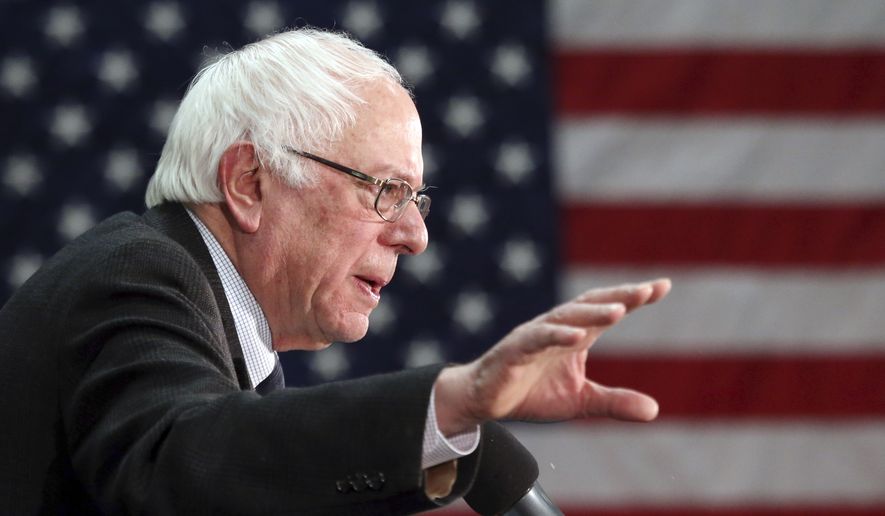Sen. Bernard Sanders of Vermont on Tuesday vowed to break up Wall Street’s biggest banks within a year of his presidency, highlighting differences with Democratic front-runner Hillary Clinton in their approaches to reforming the financial sector.
Mr. Sanders, who has been campaigning on a message of economic inequality, took direct aim at Wall Street in a speech Tuesday in New York. He called for the reinstatement of a modern Glass-Steagall Act to separate commercial banking from that of investment and insurance services — a measure Mrs. Clinton has avoided in her financial reform proposal.
He also criticized the 2008 bailout of Wall Street, which Mrs. Clinton voted for as a senator, saying three of the four largest financial institutions are nearly 80 percent larger than they were at the time.
“Greed, fraud, dishonesty and arrogance. These are some of the words that best describe the reality of Wall Street today. So to those on Wall Street who may be listening to my remarks, let me be very clear: Greed is not good. In fact, the greed of Wall Street and corporate America is destroying the very fabric of our nation,” Mr. Sanders said in his speech from Manhattan. “Here is a New Year’s resolution I will keep if elected president: If Wall Street does not end its greed, we will end it for them.”
If a big bank is too big to fail, it is too big to exist, Mr. Sanders argued. Even after the Wall Street bailout and reform, the six largest banks still control 95 percent of all derivatives and hold more than 40 percent of all deposits in the United States, he said. Within the first 100 days in office, Mr. Sanders said, his administration would compose a list of the biggest banks whose potential failure would set back American taxpayers and vowed to break them up.
He also said he would tax Wall Street speculators and use the funds to make tuition at public colleges and universities free. His administration would turn for-profit credit rating agencies into nonprofit institutions independent from Wall Street. Mr. Sanders also called for an end to payday lenders, with the Postal Service replacing them for basic banking services.
After collecting $17 million in donations from big banks over the years, Mrs. Clinton is at risk of being seen as too cozy with Wall Street. Mr. Sanders, her chief competitor for the Democratic nomination, is looking to capitalize on that image.
Mrs. Clinton’s team issued a statement on Mr. Sanders’ speech on Monday — a day before it was delivered — saying the senator does nothing to address the “shadow banking” system. That is money market funds, hedge funds and private equity funds — the products of which are complicated and risky and went largely unregulated before the financial crisis.
“Unfortunately, Senator Sanders has so far taken a hands-off approach to some of the riskiest institutions and activities in our economy, which were among the biggest culprits during the 2008 crisis,” said Gary Gensler, Mrs. Clinton’s chief financial officer and the former chairman of the Commodity Futures Trading Commission. “In his speech tomorrow, Senator Sanders should go beyond his existing plans for reforming Wall Street and endorse Hillary Clinton’s tough, comprehensive proposals to rein in risky behavior within the shadow banking sector.”
Mr. Sanders argues that the “shadow banking” system is largely just an arm of the big banks, which, if broken up, would no longer exist. His campaign also pointed out the irony that Mrs. Clinton’s statement was delivered by Mr. Gensler, a former Goldman Sachs partner and a former Treasury Department official who oversaw reforms to the over-the-counter derivatives, or swaps, market after the financial crisis.
Goldman Sachs and other Wall Street figures won’t be welcome in Mr. Sanders’ administration, he said, taking aim at Bill Clinton’s administration, where Goldman Sachs executive Robert Rubin became Treasury secretary. Wall Street executives also won’t be able to serve on the Federal Reserve Board, Mr. Sanders said.
The chief battleground between Mr. Sanders’ and Mrs. Clintons’ financial reform policies is Glass-Steagall, a Depression-era law that prohibited commercial banks from engaging in the investment business. Mr. Clinton repealed Glass-Steagall, and many analysts argue that the move paved the way for the 2008 financial crisis.
Mr. Sanders and former Maryland Gov. Martin O’Malley, the other major Democratic candidate, have called for reinstating Glass-Steagall rules. Mrs. Clinton instead has called for more limited reforms that analysts say would leave Wall Street’s structure largely intact.
Her proposals, announced in October, include enabling regulators to break up banks “if they need to be broken up,” imposing risk fees and calling for fines and potential criminal prosecutions for industry executives accused of wrongdoing.
“Secretary Clinton says we just need to impose a few more fees and regulations on the financial industry,” Mr. Sanders said. “I disagree. … Real Wall Street reform means breaking up the big banks.”
Robert Reich, an economist who served as labor secretary under Mr. Clinton, agrees. Mr. Sanders quoted his op-ed in his speech.
“In a world where the giant Wall Street banks didn’t have huge political power, [Mrs. Clinton’s] measures might be quite enough,” Mr. Reich wrote in an op-ed reviewing Mrs. Clinton’s financial proposals.
“The only way to contain the Street’s excesses is with reforms so big, bold and public they can’t be watered down. That means busting up the biggest banks and resurrecting Glass-Steagall,” he said.
• Kelly Riddell can be reached at kriddell@washingtontimes.com.




Please read our comment policy before commenting.